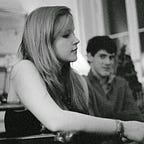The Impossible Train
The Impossible Train Story is an exercise in moral imagining — a body of work developed by a growing network of storytellers, facilitators and narrative medicine practitioners to exercise #moralimaginations.
I have a story I’d like to tell you. It’s about a train, and a group of people who live on that train and know of nothing else.
This train has been moving since anyone can remember. The people on the train can’t imagine a time when the train wasn’t moving, and when they were not on the train. Everyone works to keep the train moving. The train never stops. It never stops. It cannot stop.
People on the train live in constant churn. The work to keep the train moving is hard, and inhumane. On the train, people are treated with cruelty and oppression. Some are treated worse than others. But nobody is truly living. Sometimes they get breaks, but it is hard.
One day, a fire breaks out in one of the carriages of the train. There is panic. The fire spreads throughout the whole train… Without getting off the train everyone is going to die.
Then the impossible happens. The brakes no-one believed existed start to work. In the emergency, no-one notices how extraordinary it is that the train is stopping. They’re too focused on the fire. The old rules go out the window.
For years on the train, the “worker class” of people have been dying from the awful conditions of the work they have to do on the train. They sleep in the aisles and sometimes have nowhere to sleep at all.
Suddenly, there are orders to house them and treat their ailments.
The train stops, and people begin to get off. Apart from the sound of the fire, suddenly there is a great silence. The sound of the engines dies down, and the people can hear all sorts of sounds they’ve not been able to hear — birds are singing, the rustle of leaves.
The fire is unforgiving. The different carriages, which exist as different nations, are responding in different ways. Many people die, and mostly the people who have suffered most by the rules of the train.
Without the operation of the train to worry about, there is suddenly time to consider how they have been living. Why aren’t people always given places to sleep? What is the purpose of keeping the train going? Could it be different? Should we start the train again?
And suddenly they glimpse what’s ahead of the train. Not so far off, the track gives way to a cliff-edge, and a deep canyon many miles deep.
They have been hurtling toward a cliff-edge, unable to stop. The fire and disaster continues, but now they see a larger crisis.
People had spoken of this cliff-edge before, but it hadn’t made a difference. Because the train couldn’t stop, the train people would push this out of mind, unable to see a solution.
Now suddenly, some of the people got to work, ripping up the track from the ground.
Others were eager to get the train moving again. They had investments and beliefs in the train, and couldn’t face an alternative.
A great conversation began, among the carriages. The fire continued to blaze. More and more people realised it was a Life or Death situation.
The Impossible has happened. We’ve stopped the train.
🌟 How will the story end?
🌟 What is ours to do in this time?
🌟 What is there to lose?
🌟 Who do you choose to be?
🌟 And what will we sacrifice in order to build a different future?
We must write the end of the story together — using our #moralimaginations. We will be convening a group once a week to mobilise our imaginations together —if you are interested in coming along, please send an email to hello@moralimaginations.com. It’s open to all.
If you think this article is important, please make an effort to share it with your networks, and show your encouragement with some claps and remember you can clap up to 50 times if you like it a lot!
Follow my work and newsletter by visiting www.phoebetickell.com/subscribe.
Phoebe Tickell — Narratives, complexity, systems. Catalyzing transformative innovation in the face of converging crises, advising on complexity approaches, systems design, regenerative leadership, and education for regenerative development.
